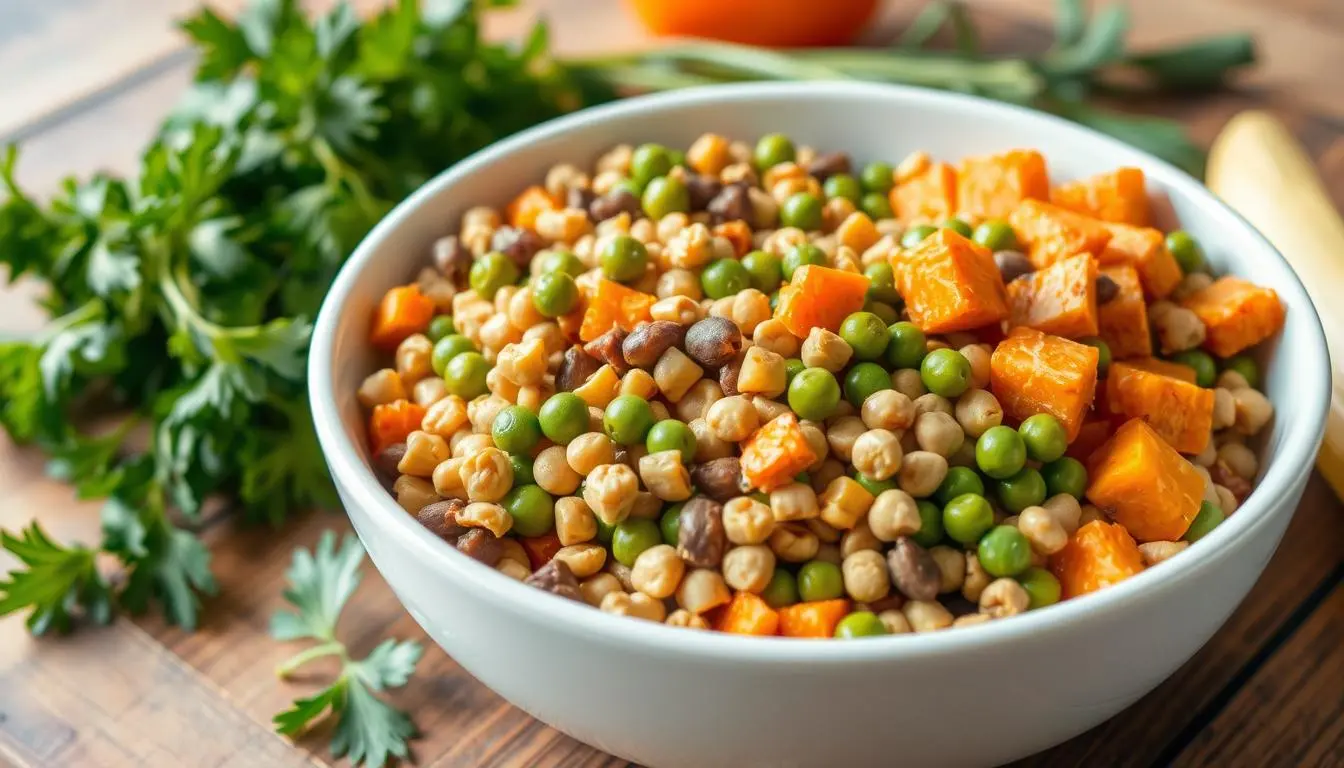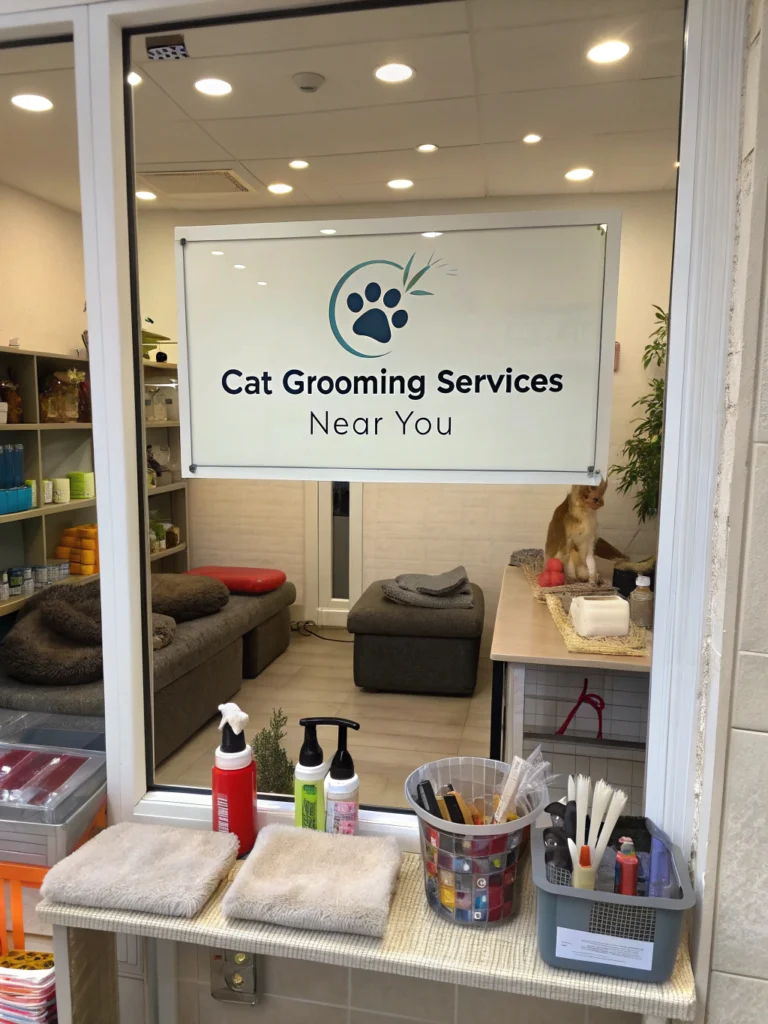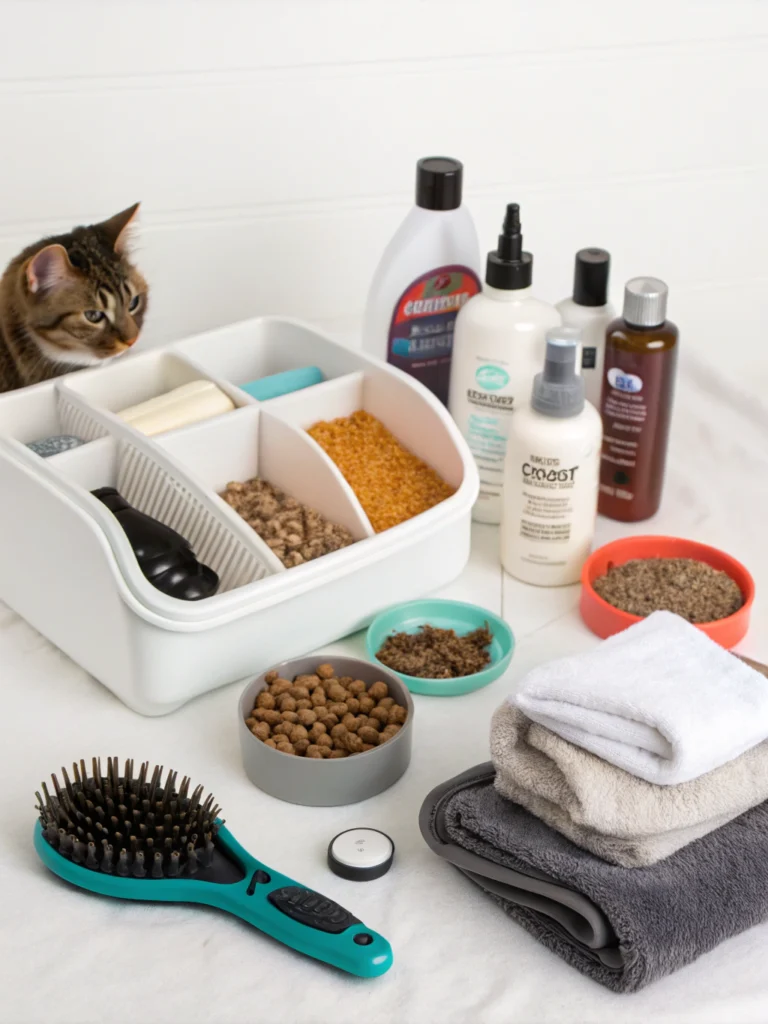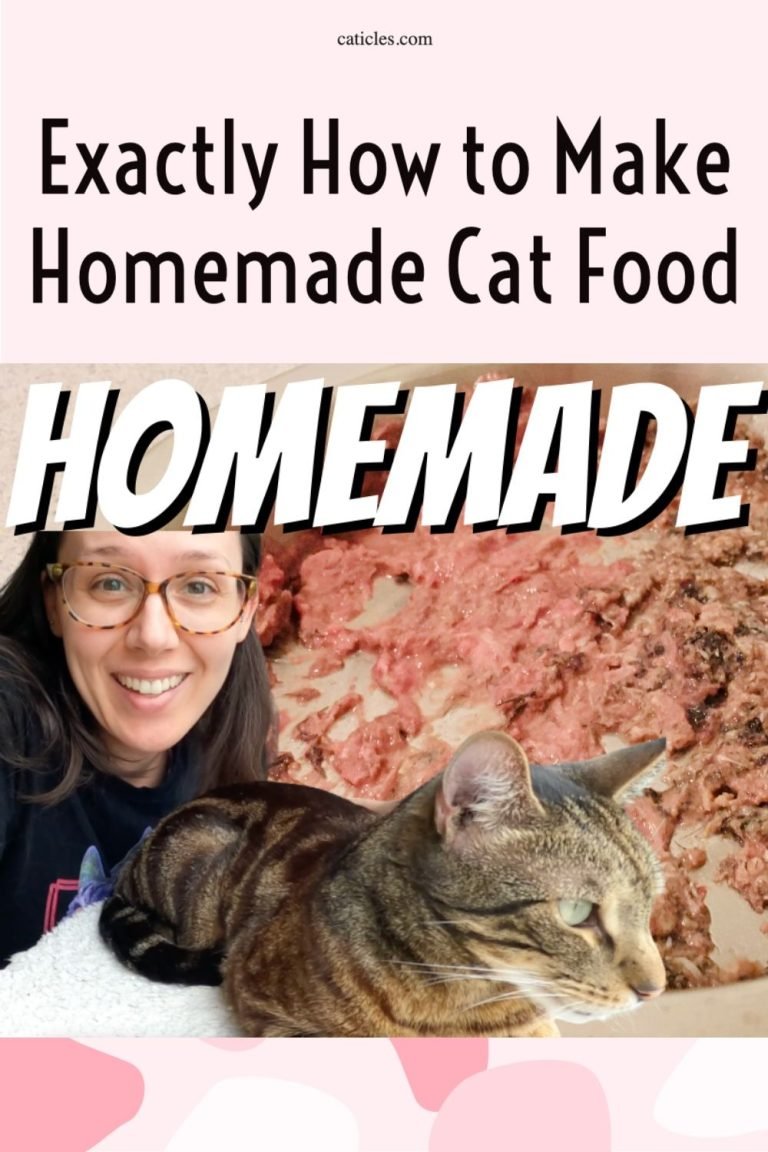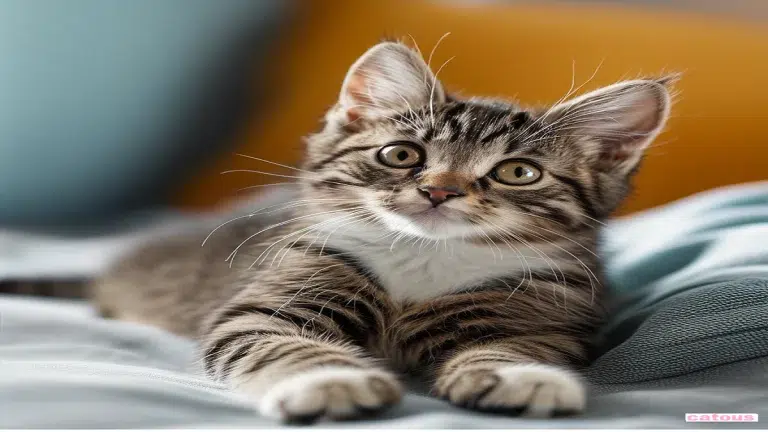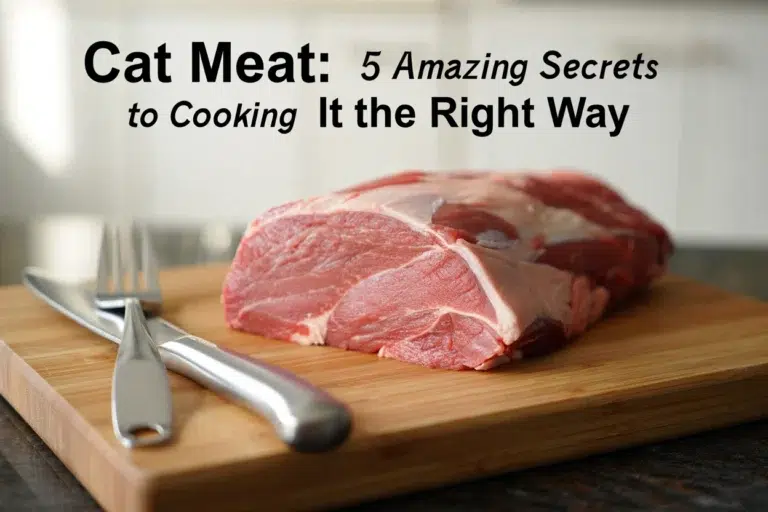Disclosure: This page may contain ads and affiliate links. We may earn a commission at no extra cost to you.
Views: 15
Disclosure: This page may contain ads and affiliate links. We may earn a commission at no extra cost to you.
Can your feline friend thrive on a plant-based diet? Many pet owners are now looking into vegan options for their cats. But is vegan cat food really good for your cat’s special needs1?
Table of Contents
In this guide, we’ll explore plant-based cat nutrition. We’ll look at the good and bad sides of a meat-free feline diet. We’ll also check out top vegan cat food brands and talk about important nutrients. This guide will help you make the best choice for your cat’s health23.,
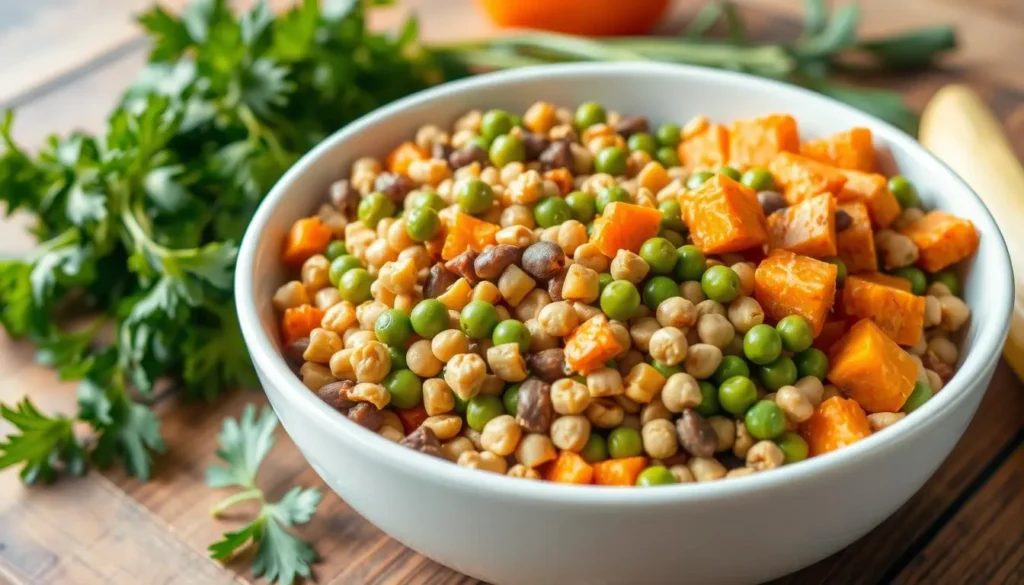
A colorful assortment of vegan cat food, featuring a variety of plant-based ingredients such as lentils, peas, and sweet potatoes, arranged in a modern bowl on a wooden surface, surrounded by fresh herbs and vegetables, natural lighting illuminating the scene.
Key Takeaways
- Vegan cat food options can provide essential nutrients, but may lack key components like taurine and arginine.
- Protein content, ingredient quality, and supplementation are crucial factors to consider when choosing a vegan cat food.
- Consulting a veterinarian is highly recommended before transitioning your cat to a plant-based diet.
- Sustainable and ethical cat food brands focus on organic, humane, and environmentally-friendly practices.
- Wet vegan cat food may be a better option than dry due to its higher moisture content and protein quality.
Understanding Plant-Based Nutrition for Cats
Vegan pet diets have become more popular, with a 600% increase in veganism in the U.S. since 20144. This trend has raised questions about whether plant-based nutrition is good for cats. It’s important to know what cats need to eat and how they are different from other animals.
The Rise of Vegan Pet Diets
Cats are obligate carnivores, needing nutrients found mainly in animal products5. They can’t digest plant foods like other animals because they lack certain enzymes4.
Essential Nutrients for Feline Health
Cats need a diet rich in 11 essential amino acids, like taurine and arginine, found in meat4. They also need more protein than dogs and many other animals4. A balanced diet is key to keeping cats healthy.
Protein Requirements for Cats
Cats need at least 26% crude protein in their diet4. Plant-based diets must be carefully made to provide the right protein and nutrients for cats4. Always get vet advice before switching to a vegan diet for your cat.
The trend for cruelty-free pet food and vegan cat treats is growing5. Brands like Botanical Bones and V-dog offer vegan options for cats and dogs5. But, always talk to a vet before changing your cat’s diet to ensure their health.
| Nutrient | Requirement for Cats | Requirement for Dogs |
|---|---|---|
| Protein | At least 26% crude protein | At least 18% crude protein |
| Taurine | Cats cannot synthesize taurine and require it in their diet | Dogs can synthesize taurine from other amino acids |
| Digestive Tract | Shorter digestive tract, better suited for a carnivorous diet | Longer digestive tract, better suited for a plant-based diet |
Understanding cats’ nutritional needs and the challenges of plant-based diets helps pet owners make better choices4. While vegan pet food is available, always consult with a vet before making big changes5.
“Balancing a pet’s diet is crucial for their long-term health and wellness.”5
Are Cats Natural Carnivores?
Cats are obligate carnivores, needing more than 70% meat in their diet6. Their digestive system is made for meat, with a short small intestine and special enzymes for animal protein6. They can’t digest plant fiber and cellulose well, which can harm them if they eat too much plant-based food6.
Cats need a lot of protein, especially kittens6. They can’t make certain nutrients like taurine and arginine, so they must get them from animal foods6. They also can’t turn beta-carotene into vitamin A and need retinol from meat6.
Not getting these nutrients can be very dangerous for cats6. They should avoid raw fish because it can cause thiamine deficiencies6. The best foods for cats are human-grade or made just for them6.
Commercial cat foods are a good start, but cats might need more to stay healthy6. Cats should never be on a vegan or vegetarian diet because they need animal-based nutrients6.
“Over a thousand cat guardians reported that cats showed a preference for vegan food, with vegan cats licking their food less compared to those on a traditional diet.“7
Even though cats might like vegan food, there’s no vegan cat food for vets to prescribe yet7. Cats on vegan diets might have a higher risk of urinary problems, but more research is needed7. Watching their urine and adding vitamin C can help with these issues7.
| Nutrient | Importance for Cats |
|---|---|
| Taurine | Essential amino acid that cats cannot produce themselves and must obtain from their diet6 |
| Arginine | Amino acid that cats must consume to remove ammonia from their bodies6 |
| Vitamin A | Cats cannot convert beta-carotene into vitamin A and must consume retinol found in meat6 |
Top Rated Vegan Cat Food Brands Review
Compassionate pet parents now have many vegan cat food options. These brands focus on your cat’s health and the planet8.
Wysong Vegan Dry Cat Food Analysis
Wysong Vegan Dry Cat Food has 26% crude protein. It also has enzymes, antioxidants, and probiotics8. This cat food supports your cat’s health with a plant-based recipe.
Evolution Diet Product Range
Evolution Diet has many vegan cat food choices. Their Vegetable Stew has 76% moisture8. These recipes meet your cat’s needs and are better for the planet.
Benevo Vegan Options
Benevo Vegan Cat Food uses non-GMO ingredients and is high in fiber9. It’s a balanced, nutrient-rich option for your cat. These formulas are made to meet cats’ special dietary needs.
| Brand | Customer Score | Protein Content | Moisture Content | Key Ingredients |
|---|---|---|---|---|
| Wysong Vegan Dry | 75% | 26% | N/A | Enzymes, Antioxidants, Probiotics |
| Evolution Diet Vegetable Stew | 60% | N/A | 76% | Plant-Based Proteins |
| Benevo Vegan Cat Food | 65% | N/A | N/A | Non-GMO, High Fiber |
These vegan cat food brands show a big commitment to pets9. As more people want plant-based pet food, there are more choices. These choices are good for your cat and the planet.
“Pets account for 25% to 30% of the meat consumed in the U.S., and the production of this meat has a significant environmental impact. Vegan cat food brands offer a more sustainable and ethical alternative that can provide complete nutrition for our feline companions.”
The Science Behind Vegan Cat Food
Brands make vegan cat food through scientific testing. They aim to create a diet as good as meat. They use soy, seaweed, oats, and more to match a meat diet’s nutrients10.
Some studies show vegan diets might help cats avoid digestive issues. A University of Guelph study found vegan diets can be good for cats’ health10.
- A study pointed out vegan diets might lack some nutrients, but it only looked at three diets10.
- A survey showed 10 vegan pet foods were as good as 19 meat-based ones1011.
- Thirteen studies found vegan diets were as healthy as meat diets for dogs and cats10.
- People said vegan pet foods tasted as good as meat-based ones1011.
- One study found vegan diets could be better for the environment10.
Research on vegan cat food is still going on. But, it looks like a well-made plant-based diet can keep cats healthy. Always talk to a vet before changing your cat’s diet11.
“The science behind vegan cat food is complex, but the goal is to provide cats with a complete and balanced diet using plant-based ingredients.”
Critical Nutrients in Plant-Based Cat Diets
More pet owners are choosing cruelty-free pet food, including meat-free options for cats. But, it’s important to make sure these diets meet cats’ nutritional needs. Cats need taurine and arginine, which are often found in animal proteins. Vegan cat foods use synthetic or plant-based sources for these nutrients12.
Taurine and Arginine Sources
Taurine is key for cats’ heart, vision, and reproductive health. Arginine helps with ammonia detoxification and immune function. Brands like Wild Earth use lentils, peas, and marine microalgae to provide these nutrients in their vegan foods12. It’s important to add these nutrients to ensure cats get enough on a meat-free diet.
Vitamin Supplementation
Cats also need specific vitamins found in animal-based diets. Vitamin A and B12 are often missing in vegan cat foods and must be added synthetically12. While synthetic nutrients help, some vets worry they might not be as easily absorbed as natural ones from meat13.
Protein Alternatives
Vegan cat food uses plant-based proteins like soy, pea, and potato protein12. Cats need more protein than dogs, so it’s crucial to choose high-quality plant-based sources. This ensures their health on a meat-free diet.
Choosing cruelty-free pet food is a big step. But, it’s important to understand cats‘ nutritional needs. By picking the right plant-based ingredients and adding necessary supplements, pet owners can keep their cats healthy on a meat-free diet.
Health Considerations for Vegan Cats
Cats with food allergies or IBD might do well on vegan cat treats and ethically sourced cat meals. But, we still don’t know much about how plant-based diets affect their health14. They could face issues like nutrient gaps, digestive problems, and urinary tract issues. It’s key to keep up with vet visits and blood tests for cats on vegan diets.
Cats need certain nutrients like taurine and arachadonic acid, which are mostly in animal products14. Many cats struggle to digest soy, a common protein in vegan cat treats and ethically sourced cat meals14. Also, GMOs in cat food might cause health issues, like cancer, in rats14.
While some cats might do well on vegan diets, we still don’t know all their nutritional needs14. It’s a challenge to ensure vegan cat treats and ethically sourced cat meals are safe for the long term. Keeping a close eye on your cat and working with a vet is crucial for a smooth transition.
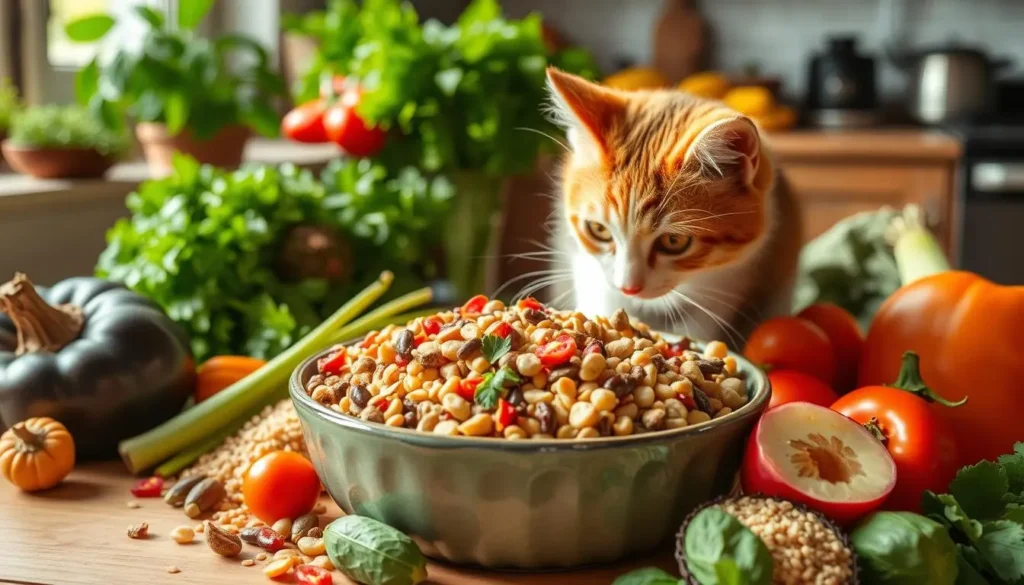
A colorful bowl of vegan cat food surrounded by fresh vegetables, legumes, and grains, set in a cozy kitchen with natural light streaming in, featuring a playful cat curiously exploring the ingredients.
Choosing vegan cat treats and ethically sourced cat meals might not be right for every cat. Some studies show vegan cats might need fewer vet visits and less medication15. But, meat-based cats could face more health issues15.
Deciding to switch a cat to vegan food should always involve a vet15. They can check if it’s right for your cat. Regular vet visits and monitoring are vital to keep your cat healthy on a vegan diet.
Transitioning Your Cat to a Vegan Diet
Changing your cat’s diet to vegan can take time and patience. It’s important to do it slowly and watch your cat’s health closely. This way, you can introduce a diet that’s good for your cat and the planet.
Step-by-Step Transition Guide
- Begin by mixing a little vegan cat food with their usual diet. Slowly add more vegan food over weeks. This lets your cat get used to the new tastes and textures.
- Watch your cat’s weight, energy, coat, and litter box habits during the change. If you see big changes, it might mean you need to adjust the diet or talk to a vet.
- Make sure the vegan cat food you pick is complete and balanced. It should have all the nutrients cats need. Don’t try to make your own vegan diet, as it can be unbalanced.
Monitoring Health Changes
It’s key to watch your cat’s health during the change. Cats need certain nutrients that plants don’t have, like vitamin A and taurine16. Look at your cat’s weight, energy, coat, and litter box habits. If you see any bad changes, you might need to change or stop the diet.
Going vegan slowly is important because not many cats have done it before16. Talk to a vet who knows about vegan pet food. This way, you can make sure your cat gets what they need.
“Transitioning 61 million cats in the U.S. to a plant-based diet could have substantial environmental benefits.”16
While vegan cat food is good for the planet, your cat’s health is most important. Watch how they do and be ready to go back to meat if needed. With careful planning and a vet’s help, you can make a vegan diet work for your cat.
Common Concerns About Plant-Based Cat Nutrition
More pet owners are turning to plant-based cat recipes. But, they worry if these diets are good for their cats. Cats need animal proteins and amino acids because they are meat-eaters17.
Some say vegan cat food might not give cats the nutrients they need. Cats also can’t digest plant fibers well. This could lead to health problems over time18.
The ASPCA says cats can’t live on vegan diets. They need nutrients from animal sources like taurine and vitamin A17. Without these, cats can get sick, even with heart and eye problems17.
Even though some studies show benefits, the risk of not getting enough nutrients is big18. Finding a plant-based diet that’s good for cats is a big challenge for pet owners who care about their pets’ health.
“Cats are obligate carnivores, meaning they must eat animal-based foods to be healthy and thrive.”17
Plant-based diets for pets are getting more popular. But, scientists agree: cats need animal proteins to stay healthy17. As we look for ways to care for our pets, we must remember their special needs.
Sustainable and Ethical Aspects of Vegan Cat Food
Pet owners are now thinking more about how their choices affect the planet. The pet food industry is huge, with a carbon footprint as big as 13 million cars for a year19. Moving to vegan cat food could lessen this impact. But, there are many ethical questions to consider.
Environmental Impact
Pets, like cats, eat as much as 63 million Americans do19. This shows how big the environmental effect of pet food is. Vegan cat food makers say their products are better for the planet because they don’t use animal products19. Yet, it’s still a big debate if cats can really eat only plants.
Animal Welfare Considerations
Cats need at least 70% meat to stay healthy19. They hunt and eat meat because it’s full of protein and special amino acids19. Putting cats on a vegan diet might not be right for them, leading to health problems20. It’s important to watch them closely if you try a plant-based diet.
The debate on vegan cat food is complex and split. It’s good to want to help the planet, but cats’ needs must come first. As more people want vegan pet food, we need more research and vet advice to make the right choices.
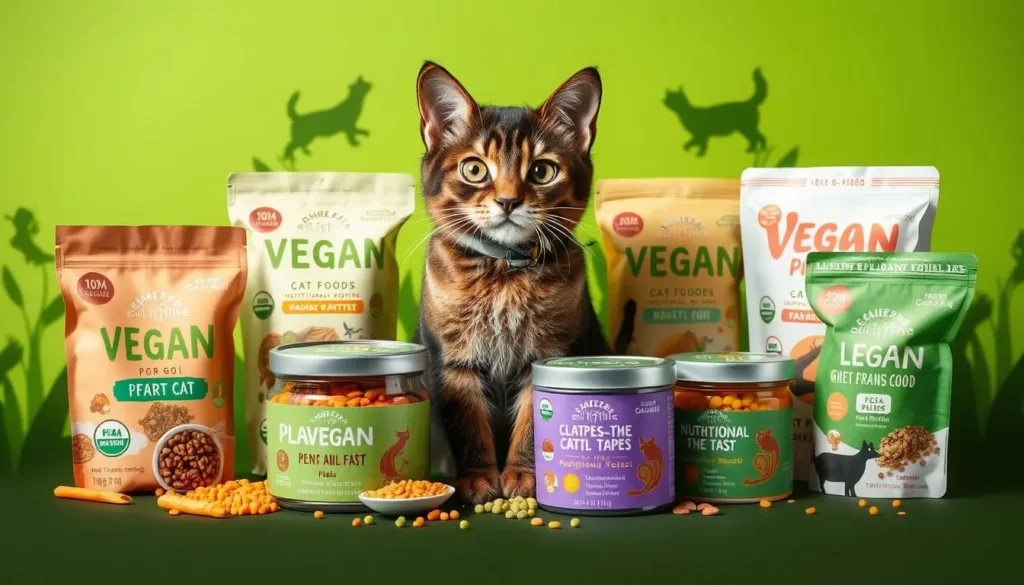
A vibrant display of various vegan cat food options arranged artistically, featuring colorful plant-based ingredients such as lentils, peas, carrots, and nutritional yeast, surrounded by eco-friendly packaging with natural textures, a lush green background symbolizing sustainability, and playful cat silhouettes nearby, emphasizing an ethical lifestyle.
| Nutrient | Meat-Based Source | Plant-Based Alternative |
|---|---|---|
| Taurine | Found naturally in meat | Requires synthetic supplementation |
| Arachidonic Acid | Primarily found in meat | Limited availability in plants |
| Vitamin A and B12 | Mainly sourced from meat | Requires careful supplementation |
“Cats are obligate carnivores and require meat protein in their diet to survive. Meat protein provides essential amino acids for cats, which are necessary for growth and development, immune function, and overall health.”20
As vegan cat food becomes more popular, we must find a balance. We need to think about the planet and what’s best for our cats. With the right research and vet advice, we can make choices that are good for everyone.
Price Comparison and Value Analysis
Vegan cat food often costs more than regular pet food. Brands like Benevo are known for their high prices21. But, fans of plant-based cat food say the health benefits and good for the planet make it worth it.
Looking at vegan cat food’s value means more than just the price. The Plant-Based Pet Food market is growing fast, expected to hit USD 26.9 billion by 202421. This shows more people want healthy, plant-based food for their pets.
In the UK, many pet food companies offer cat food at different prices22. But, the quality and nutrition can really vary22. Some expensive foods add trendy ingredients, but they might not help cats much22. On the other hand, cheaper foods with animal by-products can still be very nutritious for cats22.
| Brand | Product | Price per lb | Protein Source | Nutritional Value |
|---|---|---|---|---|
| Benevo | Vegan Dry Cat Food | $3.99 | Soy, Pea, Potato | High-quality, balanced |
| Wysong | Vegan Dry Cat Food | $2.79 | Pea, Rice, Potato | Comprehensive, well-researched |
| Evolution Diet | Vegan Canned Cat Food | $2.99 | Soy, Pea, Wheat | Balanced, complete |
Choosing vegan cat food should consider the pet’s needs, the brand’s quality, and your values and budget21. Even though it’s pricier, the health benefits and ethical reasons might make it a good choice for many pet owners21.
Expert Veterinary Perspectives on Plant-Based Diets
Veterinarians have mixed views on vegan cat diets. The British Veterinary Association warns against plant-based diets for cats. Yet, some experts think vegan meals can be safe and healthy for cats23. Professor Andrew Knight from the University of Winchester says cats can do well on vegan diets if they’re well-balanced.
It’s important to talk to a vet nutritionist before switching your cat to vegan food. They can make sure the diet has all the nutrients cats need, like taurine and arginine23. Without these, cats can get sick, gain too much weight, or have kidney problems.
Interestingly, dogs might do better on vegan diets than cats24. Studies show dogs on plant-based meals can have better skin and digestion24. This could be because dogs can eat a variety of foods, unlike cats, which need meat.
Choosing the right diet for your cat is key. You should focus on their nutritional needs and get advice from a vet23. While vegan cat treats or meals might seem appealing, your cat’s health is most important.
Conclusion
The debate on vegan cat food is ongoing, with different views from pet owners and vets. Some studies show cats can do well on plant-based diets25. Yet, vets warn that cats, being obligate carnivores, might not thrive on such diets25.
Choosing a vegan diet for your cat should be a thoughtful decision. Consider your cat’s health, your values, and get vet advice25. It’s also key to watch your cat’s health closely, as the long-term effects of vegan diets are still unknown25.
With more people looking for eco-friendly and animal-friendly cat food, the industry is stepping up. They now offer more vegan and plant-based options26. But, it’s important to make sure these foods meet your cat’s nutritional needs and to transition them safely to avoid health problems26.
In the end, deciding on a vegan diet for your cat is a personal choice. It should always prioritize your cat’s health. By staying informed, consulting with your vet, and monitoring your cat’s health, you can find the right balance in sustainable and animal-friendly cat snacks.
FAQ
What is vegan cat food and why is it controversial?
Vegan cat food is a plant-based diet for cats. It’s a topic of debate. Some vegan cat foods provide essential nutrients, while others may not be good for cats. This guide reviews top vegan cat food brands, including Wysong, Evolution Diet, and Benevo. It compares their protein content, ingredients, and health benefits. Always consult a veterinarian before switching your cat to a vegan diet.
How popular have vegan pet diets become?
Vegan pet diets have become more popular, with a 600% rise in veganism in the US since 2014. Cats need 11 essential amino acids, including taurine and arginine, which are found in meat. They require a diet with at least 26% crude protein. Plant-based diets must be carefully formulated to meet these nutritional needs.
Are cats naturally carnivores?
Yes, cats are obligate carnivores. Their diet in the wild is more than 70% meat. Their digestive system is adapted for a meat-based diet. Cats lack enzymes to digest plant fiber and cellulose, which can harm their system if forced to eat a plant-based diet.
What are some top-rated vegan cat food options?
Wysong Vegan Dry Cat Food offers 26% crude protein and contains enzymes, antioxidants, and probiotics. Evolution Diet provides options like Vegetable Stew Plant-Based Protein with 76% moisture content. Benevo Vegan Cat Food is made with non-GMO ingredients and is high in dietary fiber. These brands claim to provide complete nutrition for cats through carefully formulated plant-based ingredients and synthetic supplements.
How do vegan cat food brands formulate their products?
Vegan cat food brands formulate their products based on scientific testing to create a “complete” diet. These foods often contain soy, seaweed, oats, corn, peas, potato protein, and synthetic nutrients to replicate the nutritional profile of a meat-based diet. Some studies suggest that cats on vegan diets may have fewer digestive and liver disorders than those on conventional diets.
What are the critical nutrients in vegan cat diets?
Taurine and arginine are critical amino acids for cats, typically found in meat. Vegan cat foods use synthetic taurine and plant-based arginine sources. Vitamin A and B12 supplementation is necessary for vegan cat diets. Protein alternatives include soy, pea protein, and potato protein. However, some veterinarians warn that synthetic nutrients may not be as easily absorbed as those from animal sources.
What are the health considerations for cats on vegan diets?
Cats with food allergies or inflammatory bowel disease (IBD) may benefit from vegan diets. However, the long-term effects of plant-based diets on cat health are not fully understood. Potential risks include nutrient deficiencies, digestive issues, and urinary tract problems. Regular veterinary check-ups and blood tests are crucial for cats on vegan diets to monitor their health status.
How should you transition your cat to a vegan diet?
Transitioning to a vegan diet should be done gradually over several weeks. Start by mixing small amounts of vegan food with the current diet, slowly increasing the proportion. Monitor your cat’s weight, energy levels, coat condition, and litter box habits during the transition. Be prepared to adjust or discontinue the diet if adverse health effects are observed.
What are the common concerns about vegan cat nutrition?
Common concerns include protein adequacy, amino acid availability, and digestibility of plant-based ingredients. Critics argue that synthetic nutrients may not be as bioavailable as those from animal sources. There’s also concern about cats’ inability to properly digest plant fibers and the potential for nutritional imbalances over time.
What are the sustainable and ethical aspects of vegan cat food?
Pet food consumption has a significant environmental impact, equivalent to driving 13 million cars for a year. Vegan cat food may reduce this impact. However, ethical considerations arise when making dietary choices for obligate carnivores. Some argue that forcing a vegan diet on cats goes against their natural instincts and biology.
How do the prices of vegan cat food compare to conventional options?
Vegan cat foods are often more expensive than conventional options. Brands like Benevo are noted as particularly pricey. However, proponents argue that the potential health benefits and reduced environmental impact justify the higher cost. A cost-benefit analysis should consider long-term health outcomes, sustainability, and ethical considerations.
What do veterinarians say about vegan cat diets?
Disclosure: This page may contain ads and affiliate links. We may earn a commission at no extra cost to you.
Veterinary opinions on vegan cat diets are divided. Many veterinarians, including the British Veterinary Association, advise against vegan diets for cats. However, some experts argue that carefully formulated vegan diets can be safe and healthy for cats. Consultation with a veterinary nutritionist is recommended before starting a vegan diet.
Source Links
- 5 Best Vegan Cat Foods (2024) – Reviews & Top Picks – Catster – https://www.catster.com/nutrition/best-vegan-cat-foods/
- 5 Cat Food Ingredients to Look For & Ones to Avoid | BetterVet – https://bettervet.com/resources/pet-nutrition/cat-food-ingredients
- 7 Sustainable Cat Food Brands To Make The Most of 9 Lives – https://www.sustainablejungle.com/sustainable-cat-food/
- Do cats have special nutritional requirements? – RSPCA Knowledgebase – https://kb.rspca.org.au/knowledge-base/do-cats-have-special-nutritional-requirements/
- Veganism in Pets: Can They Eat Vegan Food? (Recipes included) | Rituals, Herbalism, and Slow Living | Casa Earth – https://www.casa-earth.com/slowliving-blog/veganism-in-pets-can-they-or-cant-they-eat-vegan-food-recipes-included
- Cats Are Obligate Carnivores: Vet-Approved Info & Feline Diet Facts – Catster – https://www.catster.com/nutrition/cats-are-obligate-carnivores/
- The Problem with Vegan Cats – https://www.stisca.com/blog/theproblemwithvegancats/
- Wild Earth launches vegan wet cat food – https://www.petfoodindustry.com/sustainable-dog-and-cat-food/news/15682263/wild-earth-launches-vegan-wet-cat-food
- Best cat food brands 2024 – Which? – https://www.which.co.uk/reviews/pets/article/best-and-worst-cat-food-brands-aT8nf7v2E1kh
- Frontiers | Should dogs and cats be fed vegan diets? – https://www.frontiersin.org/journals/veterinary-science/articles/10.3389/fvets.2024.1430743/full
- Should dogs and cats be fed vegan diets? – https://www.frontiersin.org/journals/veterinary-science/articles/10.3389/fvets.2024.1430743/pdf
- Wild Earth Launches Nutritionally Complete Vegan Cat Food – vegconomist – the vegan business magazine – https://vegconomist.com/food-and-beverage/pet-food/wild-earth-nutritionally-complete-vegan-cat-food/
- Can Cats Be Vegetarian? Vet Explained Health Concerns – Catster – https://www.catster.com/ask-the-vet/can-cats-be-vegetarian/
- Vegetarian Cats? | Little Big Cat – Dr. Jean Hofve – https://littlebigcat.com/vegetarian-cats/
- Can You Feed Cats A Vegan Diet? – Faunalytics – https://faunalytics.org/can-you-feed-cats-a-vegan-diet/
- Can My Cat Eat A Plant-Based, Vegan Diet? The Answer Will Surprise You – https://www.inverse.com/cat-plant-based-diet
- Can Cats Be Vegan? Vet-Reviewed Facts – Catster – https://www.catster.com/nutrition/can-cats-be-vegan/
- Can Dogs and Cats Eat a Vegan Diet? Risks, Benefits and Expert Advice – https://www.kinship.co.uk/pet-nutrition/plant-based-diet-for-dogs-cats-benefits-risks
- Vegan Cat Food: Safe For Cats Or A (Non)Meaty Mess? – https://www.sustainablejungle.com/vegan-cat-food/
- Why Cats Can’t Be Vegan – Purrs of Wisdom with Ingrid King – https://ingridking.com/?p=78432
- Plant-based Pet Food Market Size, Share & Report by 2034 – https://www.futuremarketinsights.com/reports/plant-based-pet-food-market
- Is more expensive better for cat food? – Vet Help Direct – https://vethelpdirect.com/vetblog/2023/12/02/is-more-expensive-better-for-cat-food/
- PDF – https://www.bva.co.uk/media/5997/bva-policy-position-on-diet-choices-for-cats-and-dogs.pdf
- Dogs can have healthy outcomes with plant-based diets, studies reveal – https://www.dvm360.com/view/dogs-can-have-healthy-outcomes-with-plant-based-diets-studies-reveal
- What is the future for vegan pet food? – https://www.petfoodindustry.com/blogs-columns/adventures-in-pet-food/blog/15682931/what-is-the-future-for-vegan-pet-food
- Vegan-friendly cat food options – https://petfoodopia.com/vegan-friendly-cat-food-options/
Disclosure: This page may contain ads and affiliate links. We may earn a commission at no extra cost to you.

